
“Baghdad Bob was just the latest in a long series of famous (and infamous) wartime propagandists that emerged in the age of mass media.”
IN APRIL, 2003, things looked bad for Saddam Hussein. Three weeks of American “shock and awe” had paralyzed his regime. The Iraqi army had been utterly routed and now, U.S. troops were surging towards the capital. Yet you’d never have guessed anything was wrong by listening Hussein’s own information minister, Muhammad Saeed al-Sahhaf.
Despite the fact that Baghdad was entirely surrounded by coalition troops, the city’s main airport was in U.S. hands and Allied warplanes had complete control of the skies above the city, al-Sahhaf continued to insist that it was the Americans who were on the ropes.
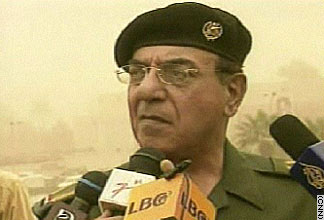
In fact, his triumphal claims were so completely outrageous, the 63-year-old propagandist quickly became something of an ironic celebrity in the west. Dubbed “Baghdad Bob,” al-Sahhaf’s face soon graced t-shirts and posters, while overnight tribute sites to him sprung up across the Internet.
“There are no infidels in the city. Never!” he thundered during one of his press conferences in the capital in the final days of the war. “We’re giving them a real lesson today. Heavy doesn’t accurately describe the level of casualties we have inflicted.”
As al-Sahhaf reiterated his boasts of Iraqi victory, the cameras of the international media panned away to reveal American tanks in the distance rumbling into Baghdad unopposed.
Al-Sahhaf continued to pitch the party line right up until April 8, when coalition forces completely overran the city. He was briefly detained by U.S. troops and released without charge. He now lives in the United Arab Emirates.
Of course Baghdad Bob was just the latest in a long series of famous (and infamous) wartime propagandists that emerged in the age of mass media. Here are some others.

Axis Sally
Mildred Gillars of Portland, Maine seemed like an unlikely spokesperson for Nazi Germany. But that’s just what the 41-year-old seamstress and one-time vaudeville performer became during the Second World War. After touring Europe in the 1930s, Gillars settled in Germany where she landed work as an on-air personality with the state radio service. Even with war looming between her native homeland and her adopted country, Gillars balked at leaving her career and German fiancée to return to the States. She later claimed she was coerced into helping the Nazis when hostilities broke between the Third Reich and the U.S. From 1942, Gillars hosted shows like Home Sweet Home and Midge at the Mic, where she spun popular tunes from the American hit parade interspersed with banter designed to weaken the morale of any GIs tuning in. Gillars soon became known in the foxholes as Axis Sally and gained notoriety for her ‘shout-outs’ to specific Allied units, even referencing their locations and objectives. These on-air mentions were supposed to convince listeners that the German army knew every move the Americans made. She continued broadcasting until the fall of Berlin in May of 1945. She was arrested and transferred to the U.S. in 1946 where she stood trial for treason. Gillars was fined $100,000 and sentenced to 30 years in prison; she served 15. Later, she worked as a German and French language tutor in Columbus, Ohio and earned a degree from Wesleyan University. She died of cancer in 1988. You can hear a recording of Axis Sally’s program here.
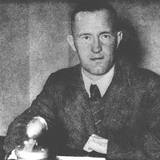
Lord Haw Haw
William Joyce also took to the airwaves for the Nazis, however the Brooklyn, N.Y. native paid for his broadcasts with his life. The American who would become famous for his on-air persona Lord Haw Haw spent much of his youth in Galway, Ireland and later lived in Great Britain. It was there that he became immersed in the pre-war fascist movement. In 1939, Joyce fled to Germany where he obtained work in radio. He was eventually assigned to the Nazi’s English language propaganda radio division. His job was to read news stories chosen to sap the spirit of Germany’s enemies. It was a writer from the British Daily Express who coined the name Lord Haw Haw, which was first applied to any and all English-speaking Nazi broadcasters. Joyce later appropriated the name for himself. Millions of Britons tuned in regularly to his show, particularly in the war’s early years. Few were likely swayed by his blatantly pro-Nazi coverage, but listeners were hungry for any information about the war, particularly news that wasn’t being reported by the heavily censored BBC. Joyce stayed on the air throughout the conflict. During the final show of his career, transmitted from Berlin just days before the city’s capture, the notorious announcer reportedly did the show blind drunk. British soldiers netted Joyce as he attempted to flee into Denmark. He was tried for treason in the U.K. Although an American citizen, Joyce was captured trying to use a British passport. Prosecutors made the case that it was sufficient proof of Joyce’s allegiance to Britain. He was convicted and hanged on Jan. 3, 1946. Check out part of a Joyce broadcast here.
Ritta Zucca
Like Axis Sally and Lord Haw Haw, the voice of Italy’s fascists during World War Two was also an American: Ritta Zucca. The Manhattan-born daughter of a well-known restauranteur, Zucca gave up her American citizenship and moved to Italy in the late 1930s in order to protect her family’s property from seizure by the fascist government. When the Allies invaded Sicily in 1943, the 30-year-old was offered a job as an English–speaking announcer in the regime’s propaganda radio division. Like Gillars, Zucca’s broadcasts included popular tunes mixed with greetings and warnings to American units fighting in Italy. Her show always began with Zucca’s trademark salutation: “Hello, Suckers!” She was arrested by the Allies a month after VE Day and eventually tried in an Italian court. She served four years and remained in Italy after the U.S. government barred her from returning the States. She died in 1998 at the age of 86.

Tokyo Rose
While GIs named all of the English speaking female announcers on Japanese radio “Tokyo Rose,” the moniker became most closely associated with Iva Toguri. A 25-year-old Los Angeles native with a degree in zoology from the University of California, Toguri was sent to Japan by her family in late 1941 to help care for a sick aunt. Five days after arriving, war broke out and Toguri was unable to return to America. Desperate to earn a living, she ended up getting a job with Radio Tokyo, first as a typist and then as a broadcaster. She eventually co-hosted a show aimed at American servicemen entitled Zero Hour. Her on-air name was Orphan Anne. During the show, she and her fellow broadcasters performed skits, played the latest hits and read out discouraging messages to American soldiers and sailors. Toguri was arrested in 1945, but soon released as there was no evidence that her broadcasts actually did any harm to the Allied war effort. Upon her return to the U.S. in 1948 however, popular pressure mounted and Washington put her on trial for treason. She was found guilty and sentenced to 10 years although served only eight. After her release, Toguri settled in Chicago and was later pardoned by President Gerald Ford after it was revealed that much of the evidence used to convict her was fabricated. She died in 2006. Listen to some of Toguri’s work here.
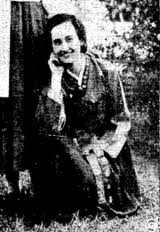
Seoul City Sue
How did a 50-year-old Sunday school teacher from Arkansas become North Korea’s most famous propagandist of the Korean War? Anna Wallis travelled to the region in the 1930s as a Methodist missionary. While overseas, she met and married a Korean national and communist sympathizer named Suh. After briefly being interned by the Japanese, the Suhs moved to the Korean capital of Seoul where Anna taught English. She was fired in 1949 due to her husband’s politics. When the communists overran the city the following year, Anna landed a job as an English propagandist with Radio Seoul. Throughout the summer of 1950, she read out menacing messages to American troops and even recited the names of captured soldiers. The GIs nicknamed her Seoul City Sue. As the South Korean capital fell to UN forces, Anna and her husband fled north where she became an on-air personality for Radio Pyongyang. Later, she toured POW camps where she would sing the praises of communism to captured soldiers. Anna remained in North Korea after the war and continued to work in the state media. She died in 1969, after reportedly being assassinated by a South Korean agent.
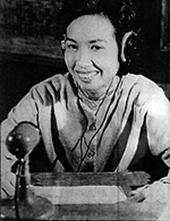
Hanoi Hannah
Trinh Thi Ngo was a favourite DJ among American soldiers and marines in Vietnam. Her broadcasts, which featured the latest rock tunes from the U.S., were a welcomed respite from the less groovy fare being served up by the American armed forces channels. Of course between songs, Trinh reminded soldiers that they were fighting an unjust war, urged them to desert and constantly teased them that their wives and sweethearts were cheating on them. What’s more, any reports of American casualties were gleefully described in vivid and discouraging detail. While her on air name was Thu Huong, Vietnamese for “Autumn Fragrance,” American troops nicknamed her Dragon Lady. Others famously called her Hanoi Hannah. Born in 1931, Trinh was just one of many female announcers who broadcast to U.S. troops during the war. She was the daughter of a factory owner and learned to speak English so she could enjoy her favourite American films, like Gone With the Wind, without subtitles. To listen to Hanoi Hannah’s show, click here.








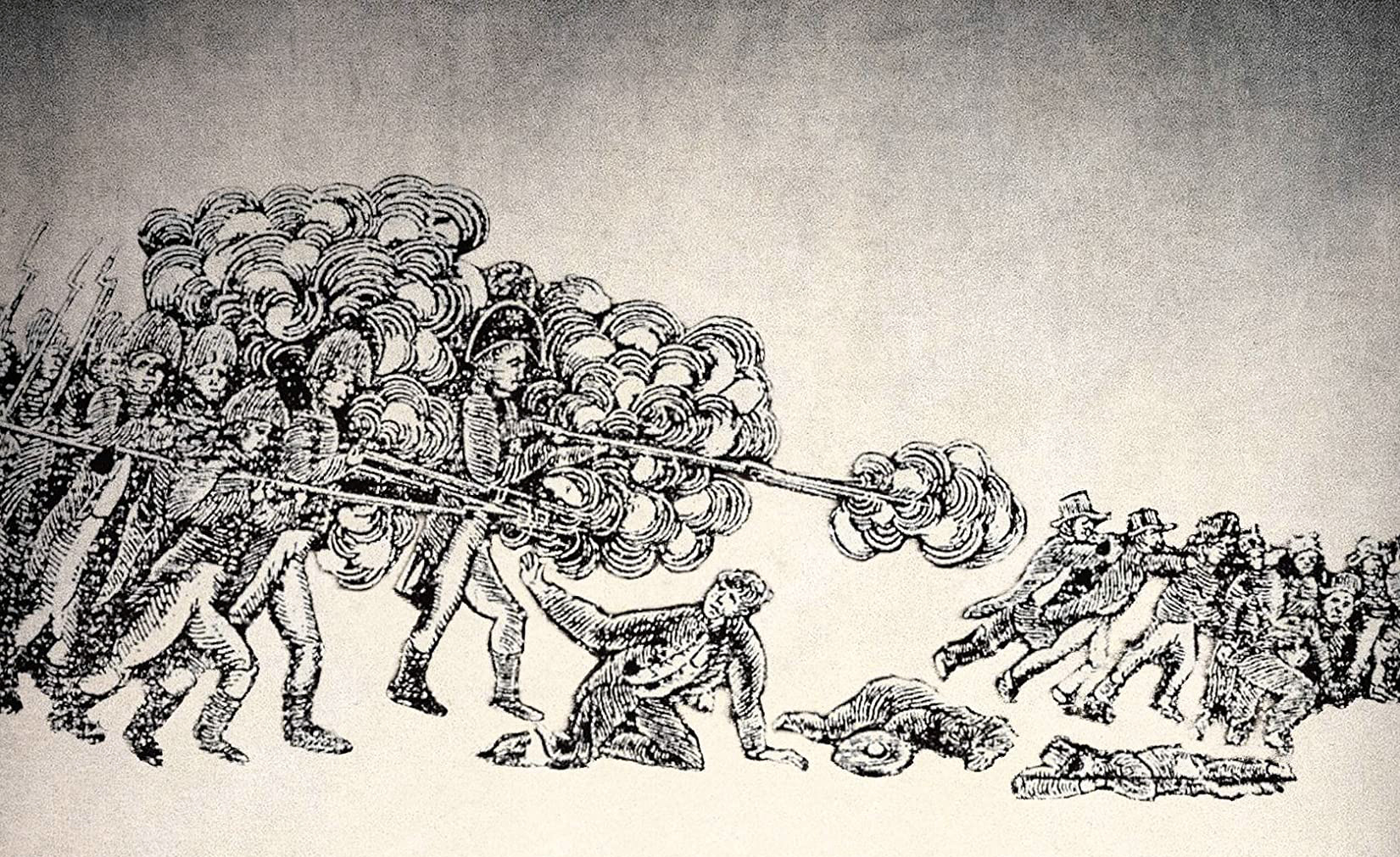

Muhammad Saeed al-Sahhaf also had nickname of “Comical Ali” in UK.
Now we have Nancy Pelosi or “Iran Nan”….